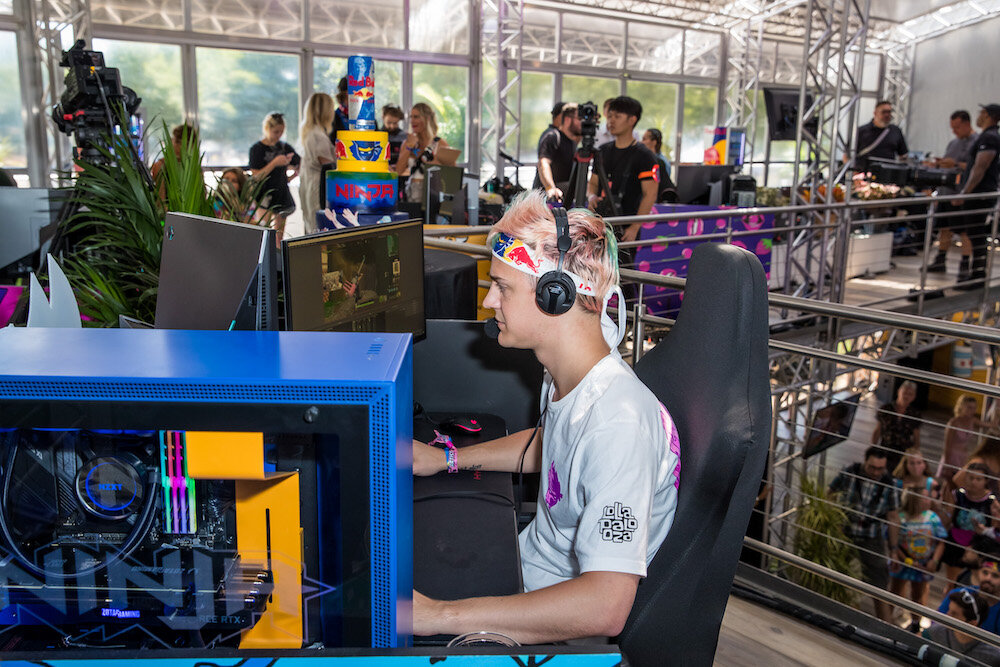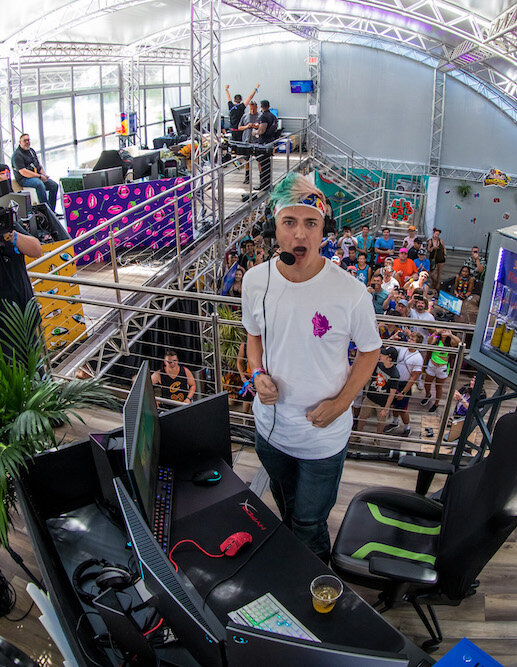Ninja's Leap To Mixer Scrambles Livestreaming But Don't Cry For Twitch Just Yet

I'm not convinced that online gaming star Ninja's sudden leap from Amazon-owned Twitch to Microsoft-owned Mixer will completely scramble livestreaming, though it's definitely stirring up the burgeoning business.
Ninja (Tyler Blevins) announced Thursday that he had signed an exclusive deal to livestream with Mixer, leaving behind the 15 million followers he'd built up on Twitch for a newer and far less trafficked platform (though admittedly, one backed by one of the few companies even bigger than Amazon).
The deal took effect today, with Blevins livestreaming from the "Ninja Dojo" inside the pavilion of one of his other big sponsors, Red Bull, at the Lollapalooza Festival in Chicago.

Ninja's move sent Mixer's app soaring today to the top of the free app charts on Apple's iTunes Store (Microsoft's Minecraft occupied the top spot for paid games, a rare daily double for non-Apple companies).
And based on chat streams on Twitch yesterday for other Fortnite players, it was about all anyone could talk about. Among the questions: what about all the kids who had bought tickets for next month's TwitchCon live event in San Diego, just so they could meet Ninja? Oh, well, San Diego is still a nice town to visit.
Blevins' jump recalls the kind of OMG moment that happened 15 years ago, when Howard Stern confirmed he was leaving terrestrial radio for the satellite service Sirius (now Sirius/XM), or perhaps the eye-popping deals that more recently enticed showrunners Shonda Rhimes, Ryan Murphy and Kenya Barris to ditch Disney for Netflix.
Blevins' deal almost certainly wasn't in the nine-figure stratosphere those old-media stars extracted from slightly newer media platforms they have since helped legitimize. His representatives declined to detail terms of the deal, but did say it won't affect his non-live output on YouTube, Instagram and Twitter, where he has a combined additional 41 million followers/subscribers.
A YouTube video of him announcing the move in a faux (and amusing) news conference, already has garnered more than 1.6 million views in a day.

For his part, Blevins said it represents less a leap into the future than a bit of a return to his past as a pro gamer on one of Microsoft's most important game titles.
"As I look at the next step in my career, achieving bigger goals in the gaming industry with Mixer will allow me to have the perfect balance of opportunities and success," Blevins said in a release. "My roots as a gamer started with Halo, so working with Microsoft and coming over to Mixer felt like a natural next step. Capturing all the great moments in gaming and sharing in the wins (and losses) with a positive, community-focused environment that we can all be proud of – that’s why I’m here."
But it's still a huge move in a business that's just getting started in a big way.
Twitch dominates the business, according to a recent study by StreamElements, which said it receives about three-fourths of all game live-streaming hours. Mixer, which launched two years ago, receives 3 percent.
As far as StreamElements CEO Doron Nir is concerned, Ninja's jump is great for Mixer, but given Ninja's less dominant position these days at Twitch, it's unlikely to hurt the industry leader much. More generally, he said, the move may help elevate the entire industry's visibility.
"In the same way that Netflix and HBO drive viewership through original programming, live-streaming platforms like Twitch, Mixer, Facebook Gaming, and YouTube Live depend on top talent to build their audiences, with Ninja being the ultimate beacon for viewers," Nir said. "While his arrival on Mixer has the potential to elevate their platform, it is unlikely to diminish Twitch's. In Q1 and Q2 of this year there have been a number of streamers who surpassed Ninja based on hours watched each month, showing that there is no shortage of talent at the top on Twitch."
Blevins told me in December he routinely spends 90 hours a week streaming on Twitch. Shifting to Mixer will be, first and foremost, an exercise in his fans willingness to follow him to a new livestreaming platform.
Given Blevins' Twitch success – he routinely ranks in the top five most-watched Twitch live streamers, according to data from StreamElements – the shift to the much-smaller Mixer platform marks a potential inflection point in the booming livestreaming business.

Blevins has become a marketing powerhouse, as demonstrated earlier this year when he and a select group of other Twitch stars were each paid as much as $50,000 per hour to play online with a new Electronic Arts game, Fortnite competitor Apex Legends, according to the Wall Street Journal. Blevins himself reportedly was paid $1 million for playing the game for hours on his Twitch stream.
He also has begun spinning off his brand with such projects as a compilation of EDM music with Capitol Records label Astralwerks, and a deal for three books through two Random House subsidiaries.
And he'll be doing more than just streaming. His representatives said in an email response that, "Tyler will be rolling out some awesome content and partner collabs that his fans will love."
Blevins' management company, Loaded, helped shepherd the deal. Loaded founder and CEO Brandon Freytag said in a release, "Ninja’s collaboration with Mixer represents the significant power of live streamers and gamers. Ninja’s long-term vision aligns well with Mixer’s commitment to taking live streaming to the next level, and we’re very much looking forward to all the opportunities this will open up for him and his fans."
Among those opportunities: Blevins also will represent Mixer in "broader gaming events and activations throughout the year," according to the release.
It's important to note, however, that Blevins no longer dominates the livestreaming space. Tfue (who's locked in a nasty legal fight right now with former business colleagues Faze Clan) actually drew more streaming hours on Twitch than did Blevins last quarter, according to StreamElements.
But even if Twitch isn't quite the green field of opportunity that it once was for Blevins, his departure has big implications for marketers. Even non-endemic brands are coming to the site in increasing numbers, hoping to connect with its young audiences of gamers and esports fans who care little for traditional media or advertising.
He'll remain associated with Fortnite, the hit game that helped propel his own popularity, but, his representatives said, Blevins "is open to all opportunities related to Fortnite and beyond. We have many opportunities in store that we think his fans and community will be excited about in the months and years to come."
Truth is, Twitch isn't going away any time soon, even without one of its biggest stars. Yes, it's hard to figure out where Twitch fits amidst the scattershot collection of video and game initiatives at Amazon (Prime Studios, Channels, IMDB Channel, Twitch Prime, the game studios, etc). But livestreaming, Twitch and the game business are deeply interconnected now. Even losing one of its big stars won't change that anytime soon.

